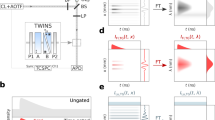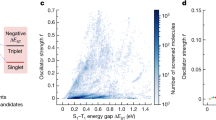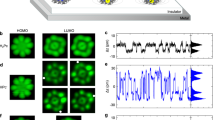Abstract
THE fluorescence of solids has generally been regarded as a comparative rarity confined to a few groups of compounds, of which the sulphides of zinc and calcium, the uranyl salts, and a number of platino-cyanides are amongst the better known. Recent observations at low temperatures suggest that many other compounds are fluorescent, and a fairly wide distribution throughout the periodic table is indicated. Table 1 gives a list of some of the more striking compounds, a number of which are not fluorescent at room temperature. The fluorescence intensity of a few of these compounds is weak even at the temperature of liquid nitrogen ; compounds also showing appreciable fluorescence at room temperatures are indicated in italics.
This is a preview of subscription content, access via your institution
Access options
Subscribe to this journal
Receive 51 print issues and online access
$199.00 per year
only $3.90 per issue
Buy this article
- Purchase on Springer Link
- Instant access to full article PDF
Prices may be subject to local taxes which are calculated during checkout
Similar content being viewed by others
References
Ewles, Proc. Leeds Phil. Soc., 3, 277 and 416 (1937–1938).
Author information
Authors and Affiliations
Rights and permissions
About this article
Cite this article
RANDALL, J. Luminescence of Solids at Low Temperatures. Nature 142, 113–114 (1938). https://doi.org/10.1038/142113a0
Issue Date:
DOI: https://doi.org/10.1038/142113a0
This article is cited by
-
Characterization and origin of low-T willemite (Zn2SiO4) mineralization: the case of the Bou Arhous deposit (High Atlas, Morocco)
Mineralium Deposita (2017)
-
Cooperative luminescence of condensed media
Journal of Applied Spectroscopy (1967)
-
Luminescence spectra and vibrations in crystal lattices
Proceedings of the Indian Academy of Sciences - Section A (1943)
Comments
By submitting a comment you agree to abide by our Terms and Community Guidelines. If you find something abusive or that does not comply with our terms or guidelines please flag it as inappropriate.



